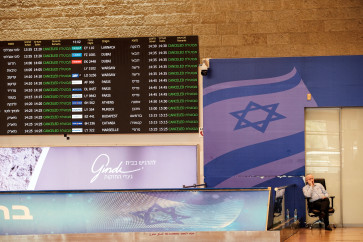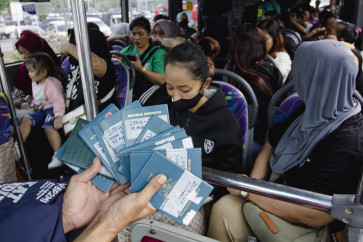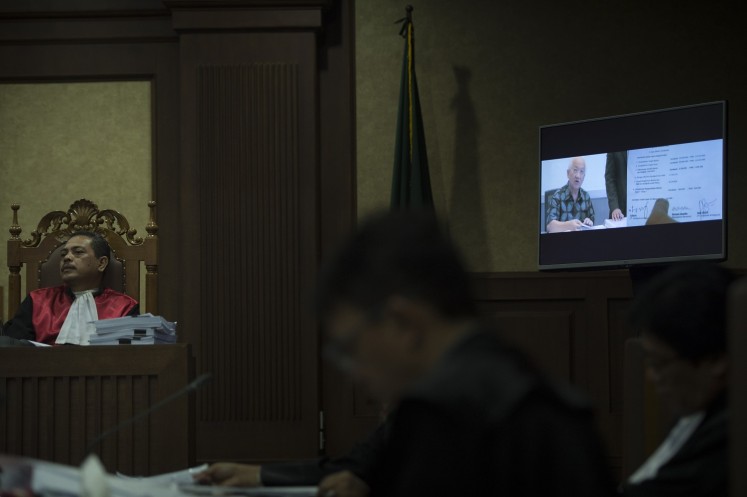Popular Reads
Top Results
Can't find what you're looking for?
View all search resultsPopular Reads
Top Results
Can't find what you're looking for?
View all search resultsGovt maintains bar for 2017 tax revenue
The government appears confident about this year’s tax income, despite having achieved less than 40 percent of the full-year target by the end of May
Change text size
Gift Premium Articles
to Anyone

T
he government appears confident about this year’s tax income, despite having achieved less than 40 percent of the full-year target by the end of May.
Taxes collected during the first five months of the year, the latest data from the tax authority show, amounted to Rp 584.9 trillion (US$44 billion), representing 39 percent of the Rp 1.5 quadrillion tax revenue target for 2017.
That figure, however, is still better than that for the corresponding period of 2016, when tax revenue collection had only reached 26.8 percent of the annual target.
Finance Minister Sri Mulyani said it was too early to conclude that revenue this year would fall short of the target, arguing that “the tax collection pattern is not linear” throughout the year.
“The government expects tax revenue to increase in June and toward the end of the year during the celebrations of religious events [Idul Fitri and Christmas], during which holiday bonuses are distributed,” she said on Tuesday in a hearing with lawmakers.
The government expects to collect Rp 1.75 quadrillion in revenue throughout 2017, with most coming from taxation.
Non-tax revenue (PNBP) collection, meanwhile, has performed much better than tax collection, reaching Rp 121.4 trillion by May, nearly half of the full-year target.
Rp 1.27 quadrillion of this year’s tax revenue target is expected to come from non-oil-and-gas taxes, Rp 191 trillion from excise and Rp 35.9 trillion from oil and gas taxes.
The government expects to secure more than 90 percent of the non-oil-and-gas tax revenue with regular efforts, with the remainder requiring “extra efforts.”
“There are Rp 70 trillion to 90 trillion [in potential non-oil-and-gas tax revenue] that we likely need to collect with extra efforts,” Sri Mulyani said.
Taxation director general Ken Dwijugiasteadi said that extra efforts would include taking into custody disobedient taxpayers that owe at least Rp 100 million to the state. The method is refered as ‘gijzeling’, a Dutch term literally translated as ‘taking hostages’.
“We have carried out multiple gijzeling actions this year, but we have yet to publicly announce the details,” Ken said.
Ken added that so far the office had already collected Rp 20 trillion tax in arrears, with the gijzeling bringing in more than Rp 5 trillion.
“Gijzeling does not mean to criminalize those disobedient taxpayers, we only take their freedom for a while, until they pay their taxes,” he said.
In an earlier hearing with members of House of Representatives Commission XI, which oversees finance, the government proposed a potential double-digit percentage increase for next year’s spending to push significant economic growth in the final full year of President Joko “Jokowi” Widodo’s current administration.
Through the proposed 2018 budget, the government expects to see the gross domestic product (GDP) increase by between 5.4 percent and 6.1 percent, marking a significant jump from the 5.1 percent target outlined in this year’s budget. The growth range, however, was revised down to 5.2-5.6 percent at Tuesday’s hearing.
To achieve such an ambitious target, the government is proposing to spend between Rp 2.2 quadrillion and Rp 2.35 quadrillion next year. The figures represent an increase between 5.96 percent and 12.93 percent from the Rp 2.08 quadrillion spending allocation in the 2017 budget.
Amid a weak global economy and falling energy prices, Indonesia saw its GDP rise only 4.79 percent in 2015, the lowest rate in six years. Last year, the economy grew by 5.02 percent.









